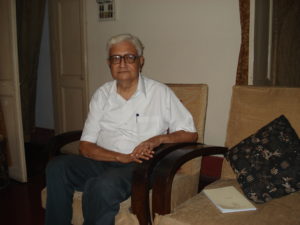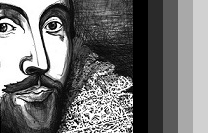Monday,11,2019
 Formerly of the Department of English, Presidency College, Kolkata.
Formerly of the Department of English, Presidency College, Kolkata.
Interviewed by Dr. Paromita Chakravarti and Sri Abhishek Sarkar.
Year of passing B.A. and M.A.
B.A.-1956, M.A. - I went to Oxford half-way through doing my M.A. and then got my degree there in 1964 or 1965.
Details of institutions concerned.
I went to Presidency College here. Then, I went to Calcutta University for a little while. In Oxford, I attended University College.
When did your first encounter with Shakespeare take place (at school or college)?
There was no Shakespeare taught in school. I attended Ballygunge Government High School. I first came across Shakespeare in college.
However, since my father was a professor of English Literature, he had made me read scenes from Macbeth, Merchant of Venice, Julius Caesar etc. So, by the time I had arrived in college, I was familiar with Shakespeare.
Say something about your father.
My father, Tarapada Mukherjee was a phenomenon, you could say. He was a brilliant student. He came to Calcutta after attending school in the village. Professor P. C. Ghosh was very fond of him. He taught at Rajshahi College in 1926. He came to Presidency College in 1931 and taught there without break till 1962. He was a great teacher. People still talk about his classes on Shakespeare and other poetry. In particular, he taught Shakespeare, Milton, Chaucer, and other Victorian poets. He also had great pupils, who went on to become famous scholars themselves. His voice modulation is something his students recall till date.
College and university syllabi (Shakespeare plays and poems).
At the B.A. level, we had four plays: Much Ado About Nothing, Macbeth, Richard II and Julius Caesar.
At the M.A. level in Calcutta University, we had Antony and Cleopatra among other plays, but I didn’t stick around for long.
Who taught the texts in question?
In Presidency College, we were taught by Tarak Nath Sen, my father Tarapada Mukherjee and Subodh Chandra Sen. Tarak Nath Sen taught us Macbeth, my father taught us Richard II and Julius Caesar and Subodh-babu taught us Much Ado About Nothing.
What techniques were used (e.g., close reading, lecture demonstration, group discussion, seminars etc) for teaching Shakespeare?
Back then, the emphasis used to be on close-reading of the texts. But there were also discussions on source material and necessary comparisons. For example, the person teaching historical plays would refer to Marlowe and the person teaching comedies would mention Lyly. There wasn’t really much of theorization in our time.
What traits of any particular teacher impressed you most?
Each of the teachers had different traits which were very impressive. My father would do a vivid, dramatic reading, like P. C. Ghosh who had taught him. We could actually picture the events of the play through his animated reading.
Tarak-babu’s approach was more scholarly. He would give us a long introduction, mentioning relevant sources. Then, he would go on to do a minute reading of the text with interpretations. However, because of his health perhaps, he couldn’t read out loudly or dramatically. He was brilliant with small classes, and had a great intellectual appeal.
Subodh-babu was very scholarly. I personally thought his style of teaching wasn’t very attractive, but what he said in his lectures was very rich.
Did the teacher enact the scenes in the class room?
My father did enact scenes. Tarak-babu, I am sure, in his heyday would have taught dramatically. But in our time, because of his health perhaps, he couldn’t act out the scenes. But he would try to read it as well as he could.
Was the teacher very particular about pronunciation and accent?
Their pronunciation was alright for the most part, but they were not very bothered with proper accent and intonation. In their readings, they did explain however where the stresses would be placed.
Were expletives and sexual references omitted?
They were not omitted, but they did not explain things in detail. They would go over these sections, indicating that there is an indelicate suggestion in places. Shailendra Kumar Sen, who came later, would stop at these sections.
How far was the socio-historical context of plays discussed?
They were discussed whenever they were deemed to be necessary, especially when studying historical plays.
We were also instructed to read Holinshed’s Chronicles at times. The sources and deviations from the same was something they all spoke about.
Were Shakespeare’s contemporary dramatists given the same amount of importance in the classroom?
Not quite. But there were frequent comparisons made with Kyd, Marlowe and Lyly. Even Jonson and Webster were sometimes mentioned. None of their plays were studied in detail at the B.A. level, but they were surely a part of the M.A. level.
Were students encouraged to think independently and challenge the teacher?
Hardly so. It was a bit of a ‘one way traffic’, where we were passive listeners. Occasionally, some of us had the courage to speak up and ask questions. They would always answer these questions, but for the most part, they were such stalwarts that none of us could really talk in their presence.
Editions and critical material prescribed and used.
They would recommend the Arden editions, but sometimes they would mention Verity, New Clarendon or Warwick editions as well. They did not like Dover Wilson, especially Tarak-babu. They would ask us to avoid the New Cambridge editions.
Examination and question pattern.
There would be general critical questions about character, structure, plot, importance of certain scenes, treatment of sources etc. There was also compulsory reference to context questions. The emphasis was very much on reading the text closely.
Did the teacher refer to stage and film productions of Shakespeare?
Occasionally, they would refer to more important productions, like Laurence Olivier’s for example. But this was very rare.
Whether the text was related to performance conventions.
Very much so. We would discuss the nature of soliloquy scenes, or how night scenes were done in Shakespeare’s time when the performances were actually happening in the day time. The use of boys to play the roles of women was also talked about.
Whether there was any performance of Shakespeare at the institution.
There were no Shakespeare productions in our time at Presidency College. When I was abroad I saw a lot of Shakespeare productions though.
Other productions.
Utpal Dutta was performing at the time.
I do not recall any foreign troupes coming in at the time, although there were foreign scholars coming in, whose lectures we attended. I do not recall their names, but the editor of the Arden edition of The Tempest came on a visit.
Account of classmates who later distinguished themselves as teachers, performers etc.
Jasodhara Bagchi was my classmate. So were Nabaneeta Deb Sen, Shanta Bhattacharya and Bandana Roy Sanyal.
I cannot recall any performers though. Richard Hampton, the actor, studied with me in Oxford. He was a great performer but did terribly in the examinations.
Noticeable changes in Shakespeare pedagogy and student reaction over the decades.
It has been sixteen years since I have retired so I don’t know what it is like today. But I hear about the use of films and multimedia, which leads to comparisons. This is a good change, I must say.
Students, I found, were always very responsive. They would recall what was taught in class, and quote them later. They were enthusiastic about the lectures and remember them for ages afterwards.
Do you think that Shakespeare is an overrated author?
I find this a very strange question. He is a genius for all the ages. We have no system to rate him, so there is no question of calling him overrated. Can you point to another author who has peopled this world of ours with so large and diverse a company of characters who appeal to the affections and haunt our memories? I have never found another like him.
I will admit that eighteenth century critics were sometimes unkind to Shakespeare. They said he did not follow the three unities. Tolstoy and Shaw were also unsympathetic towards Shakespeare: Shaw said that Shakespeare was not a thinker and that he was out of sympathy with democracy while Tolstoy said there is not much religion or morality in Shakespeare. I think they applied wrong criteria to the judgement of art and poetry; they considered ethics in opposition to aesthetics. And as far as morality is considered, think of the loftiness and delicacy of Shakespeare: widely tolerant of frailty and exuberance, but never of calculated evil. That is incredible. So there is no question of being Shakespeare being overrated.
How would you react to the present trend of de-glamorizing and de-canonizing Shakespeare?
I react rather favourably to it. Shakespeare does not belong to any single coterie anymore. Shakespeare has spread all around the world. There are adaptations in every country and in every form. It has been published, translated, filmed, performed, adapted, bowdlerized, appropriated, parodied, politicized, illustrated and so on. They are making Hindi films about Shakespeare, for example Maqbool from Macbeth and Omkara from Othello. When Shakespeare wrote, he wrote it and gave it to the stage manager. He was appealing to the masses; he did not care for what the stage manager did with it. He was not a scholar like Jonson, but rather a popular writer. So why impose a textual authority on him and canonize him? This was all the doings of critics. I read somewhere that the canon is an artificial function of evolving cultural politics. It is best to de-canonize the canon now.
How would you react to the phenomenon of reading Shakespeare in a simplified language or in paraphrase, now popular among students in the West?
I do not know what they do in the West, but I do not think that they use simplified language at the undergraduate level. Perhaps they use it in schools for very young readers.
But what Shakespeare will one read if they don’t read him in his language? How will they appreciate Shakespeare this way?
What differences have you noticed between Shakespeare teaching your country and abroad?
Lectures were optional in terms of attendance, but one had to write long essays in response to things which the teachers would provide comments on.
